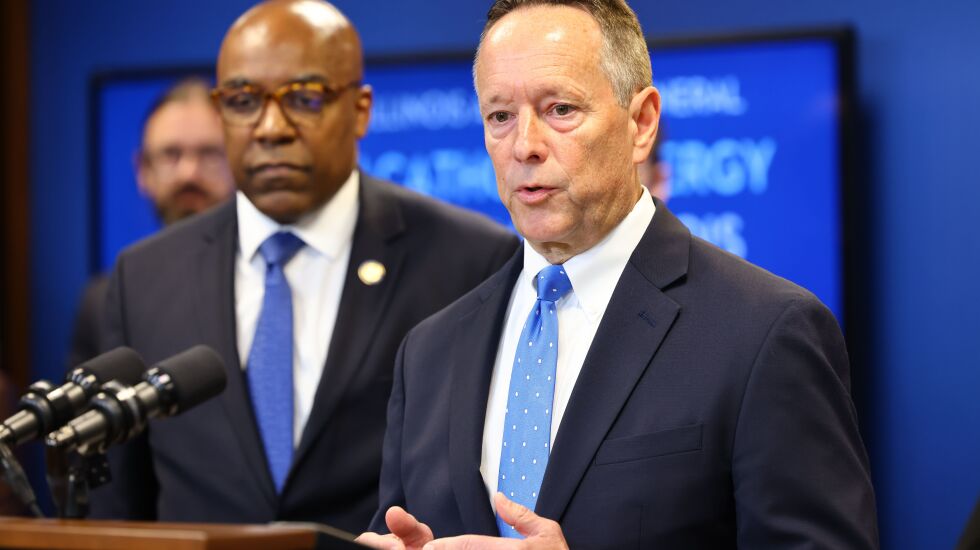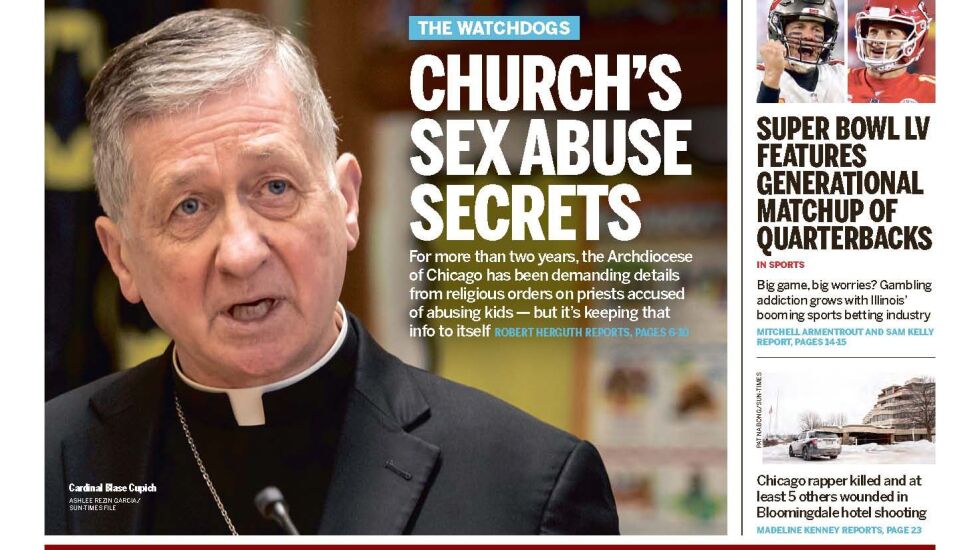
In August 2018, shortly after then-Illinois Attorney General Lisa Madigan announced an investigation into whether the Catholic church in Illinois had fully disclosed the scope of child sex abuse by priests and other clergy members, Cardinal Blase Cupich said the church had nothing to hide.
“Our record’s clean,” the top Catholic cleric in Chicago told a closed-door gathering of about 200 men studying at the Mundelein Seminary to be priests, according to sources who were there. “I’m confident that, when the attorney general looks in our files ... that she will, in fact, find that we’re doing our job.”
“We posted all of the names,” Cupich told the group, referring to the publicly available church list of clergy members in the Archdiocese of Chicago deemed to have been credibly accused of sexual abuse.
Cupich’s assertions were far off the mark, according to the results of the investigation announced Tuesday by Madigan’s successor, Kwame Raoul, who said the archdiocese, covering Cook and Lake counties, and the rest of the Catholic church in Illinois failed to acknowledge hundreds of allegedly abusive priests and other religious figures.
“Before this investigation, the Catholic dioceses of Illinois publicly listed only 103 substantiated child sex abusers,” Raoul wrote in a 696-page report detailing the findings. “By comparison, this report reveals names and detailed information of 451 Catholic clerics and religious brothers who abused at least 1,997 children across all of the dioceses of Illinois.”
Did church officials lie?
Asked whether church officials had lied in not making public that the extent of clergy sex abuse was more than what they reported, Raoul said at a news conference Tuesday, “I think the numbers sort of speak for themselves.”
His office determined that after reviewing more than 100,000 pages of records from the six main arms of the church in Illinois: the Chicago archdiocese, the dioceses of Joliet and Rockford that cover the collar counties, and three other dioceses covering downstate.
Raoul said his office — the state government’s legal representative as well as being a consumer advocate — fielded more than 600 “confidential contacts from survivors” during the investigation. The report chronicles some of their stories.
Some of the abusive clergy already had been known to church authorities; others apparently weren’t and came to light from the investigation.
“Decades of Catholic leadership decisions and policies have allowed known child sex abusers to hide, often in plain sight,” Raoul wrote. “And because the statute of limitations has frequently expired, many survivors of child sexual abuse at the hands of Catholic clerics will never see justice in a legal sense.
“It is my hope that this report will shine light both on those who violated their positions of power and trust to abuse innocent children, and on the men in church leadership who covered up that abuse.”
Raoul said that by naming the offenders in his report, “The intention is to provide a public accountability and a measure of healing to survivors who have long suffered in silence.”
Cupich: Church was singled out
Cupich responded with a video posted on YouTube and a written statement in which he was quoted as saying, “We have not studied the report in detail but have concerns about data that might be misunderstood or are presented in ways that could be misleading.”
Cupich also said Raoul gave the impression that the “church is more worthy of investigation because it is a trusted religious organization” and said: “We think all children deserve to be protected, regardless of whether they are cared for by a religious or secular institution. It isn’t fair or wise to focus only on the Catholic church, which has made the greatest strides in this area.”
A goal of the Illinois investigation — spurred by the 2018 findings of a grand jury investigation in Pennsylvania that found more than 300 Catholic clergy members there had molested more than 1,000 kids over the preceding decades — was to “obtain a complete accounting of substantiated child sex abuse committed by Illinois Catholic clerics.”
Cupich told the seminarians in 2018: “We are not what happened in the grand jury in Pennsylvania.”
Yet Raoul’s agency found that the numbers of abusers and victims in the Catholic church in Illinois are “far greater than those reported by the Pennsylvania grand jury.”

Nationally, the clergy sex abuse scandal came to light in the 1980s, and it has unfolded in waves since then, with additional accusations of child rape by priests and revelations of repeated coverups by the church hierarchy.
Joliet diocese criticized
Raoul reserved some of the harshest language in his report for the Joliet diocese, which includes DuPage and Will counties.
“In the context of all Illinois dioceses, the Diocese of Joliet has been ahead of the curve in installing policies and procedures to respond to and prevent clerical child sex abuse,” the report said. “Even so, the diocese has demonstrated slavish adherence to off-the-books, unwritten policies that derail justice for abuse survivors and much-needed institutional transparency.”
Raoul pointed to changes in church practices because of his agency’s investigation, including more public accounting, but said more still needs to change.
When the inquiry was launched under Madigan, just two of the six dioceses in Illinois maintained a publicly available list of predator priests: the Chicago archdiocese and the Joliet diocese. And those lists were riddled with omissions.
Now, all six of the Illinois dioceses have made public the names of clergy members they have deemed to be credibly accused of sexual abuse.
The archdiocese has “changed its policy,” according to Raoul, and no longer ignores accusations against clergy who have since died, instead now reviewing “new allegations against deceased clerics.”
Spurred by the investigation and following a series of Chicago Sun-Times reports over the past several years, Cupich also has begun listing some but not all sexually abusive clergy from religious orders, such as the Carmelites, Claretians, Dominicans, Franciscans and Jesuits, who have served in his territory.
While many clergy working in a diocese report to the local bishop and minister in a single place, orders often operate across multiple dioceses and even states. They typically follow the teachings of a particular saint and focus on a specialized ministry, such as education or healthcare.
The Sun-Times has reported that, even with the increased transparency, the Chicago archdiocese has still failed to publicly acknowledge many child molesters from those religious orders, whose members run or staff most Chicago-area Catholic high schools.
And Raoul’s investigation — which looked at church failures over seven decades — found that the church is still slow to embrace full disclosure, with 160 abusers “not disclosed” on diocesan websites at the time the inquiry wrapped up. Most of those are members of religious orders.
But Raoul said his agency did not seek records directly from religious orders, relying instead on information about abusive order clergy that was in the hands of diocesan officials or others.
‘There could be more’
Asked whether that means the investigation might not have turned some abusive order clergy, a Raoul aide, Thomas Verticchio, acknowledged, “There could be more.”

Raoul offered several recommendations for reforms. Among them, he called for greater transparency by church officials — including disclosing more information about abusive clergy who are members of Catholic religious orders and also placing instructions on parish websites and not just on diocesan websites for “how to” report abuse.
Another recommendation is for all religious orders to report “any allegation of child sex abuse by a religious order member to the diocese.” It also says that if any order fails to abide by that or other recommendations, it should “lead to their members being barred from ministering within the boundaries of the diocese.”
Though they are run largely independently, orders already must seek the approval of the bishop of any diocese in which they operate for their members to offer any type of ministry.
In other states in which an attorney general has launched a similar investigation, including Wisconsin and Pennsylvania, that has resulted in criminal charges being filed in some cases.
Raoul said that, “If there was any sort of doubt over the statute of limitations” and whether an abuser might still be able to be charged in Illinois, his agency contacted local prosecutors. But he said he isn’t aware of anyone being charged as a result.
Could extend statute of limitations
Other states also have changed laws that extend the statute of limitations to give clergy sex abuse victims a new window of time to file lawsuits.
To do so in Illinois would require changing the state constitution. Raoul wouldn’t say whether he would support such a move.
Asked whether Gov. J.B. Pritzker would, a spokeswoman said, “The governor is always interested in taking steps to support survivors of sexual abuse. I think our next step will be to talk with Attorney General Raoul about this issue.”
SNAP, a group of survivors of clergy sexual abuse, called Raoul’s findings “a stunning report” and said: “It is to us, in a word, disgusting that these supposed shepherds would lie so blatantly.
“Almost all of these survivors were ignored by the Catholic leaders to whom they reported. In nearly every case, church officials chose to accept the words of abusers and the recommendations of other trash-passing bishops that it was the priest who was innocent, not the victimized child.”
READ MORE








